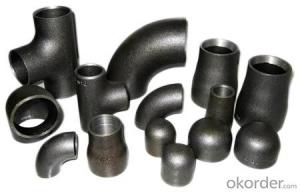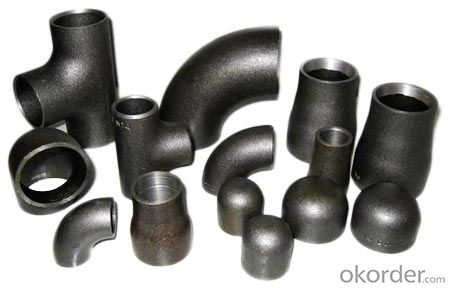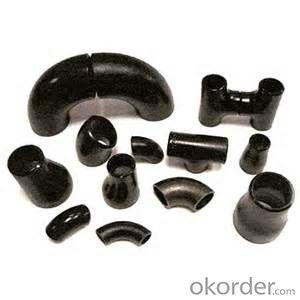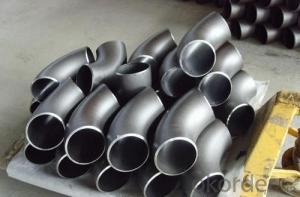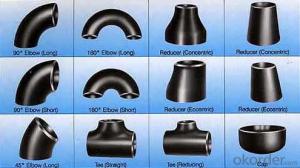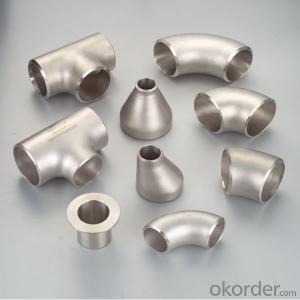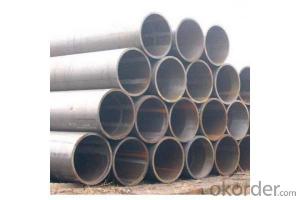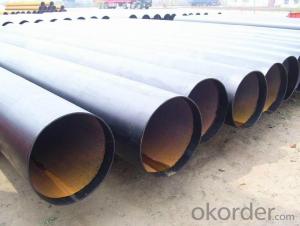2'' CNBM carbon steel pipe fittings ISO/ BS EN/DIN/ API
- Loading Port:
- Tianjin
- Payment Terms:
- TT OR LC
- Min Order Qty:
- 5 m.t
- Supply Capability:
- 300 m.t/month
OKorder Service Pledge
OKorder Financial Service
You Might Also Like
Products Detailed Description
Products | pipe fittings elbows, bends,tees, reducers caps |
Size | 1/2" - 48" |
Wall thickness | Sch5-Sch160 XXS |
Standard | ANSI, ASME API5L, OCT, DIN and JIS, etc. |
we can also produce according to drawing and standards provided by customers. | |
Material | Carbon steel, alloy steel and stainless steel. |
We can produce according to materials appointed by consumers. | |
Packaging | Plywood Cases,plywood pallet, plastic bag or as customers requirement |
Surface Treatment | Shot blasted, rust-proof black oil |
Delivery Time | 10-60 days |
Quality | First grade |
Others | 1.Special design available according to your drawing. |
2.anti-corrosion and high-temperature resistant with black painting | |
3. All the production process are made under the ISO9001:2000 strictly. | |
4. A conformity rate of ex-factory inspection of products. |
Specifications
Ansi B16.9 WPB carbon steel pipe fitting elbow tee reducer
Size:Seamless 1/2"-24" Welded 1/2"-48"
ANSI B16.9 WPB carbon steel pipe fitting elbow tee reducer
1.Size: Seamless 1/2"-24" Welded 1/2"-48"
2. WT: SGP, STD, SCH40, SCH80, SCH100,SCH120,SCH160,XS,XXS
3. Material:
stainless steel Grade: 201,304,304L,316,316L,317,317L,904L,and etc
carbon steel Grade: WPB,GRB, Q235,16MN
Alloy steel: st35.8,st52,wp11,wp22,wp12 wp l6
4. Standard: ASTM/AISI/DIN/JIS
5. Type: Concentric and eccentric
6. Surface treatment: Transparent oil, rust-proof black oil
7. Applications range: Applications range: for use in the petroleum, smelting, foodstuff, power, papermaking, chemical, medical equipment,aviation, boiler heat exchanger, and other fields
8. Packing: wooden case or as per customers' requirement
- Q: Who knows what is the difference between double submerged arc welded pipe and longitudinal submerged arc welding?
- Double submerged arc welding should be for spot welding and single side welding, they are straight line welds, but double submerged arc welding seam is more beautiful and fine.
- Q: How do you select the right size of steel pipe for a project?
- To select the right size of steel pipe for a project, you need to consider factors such as the intended application, flow rate, pressure requirements, and structural integrity. It is essential to consult industry standards and guidelines, conduct engineering calculations, and seek professional advice to determine the appropriate pipe size that ensures optimal performance and safety for your specific project.
- Q: Can steel pipes be used for heating and cooling systems?
- Yes, steel pipes can be used for heating and cooling systems. Steel pipes are commonly used in HVAC (heating, ventilation, and air conditioning) systems as they have excellent heat transfer properties, durability, and can withstand high-pressure conditions. Additionally, steel pipes are resistant to corrosion, making them suitable for both heating and cooling applications.
- Q: How are steel pipes used in the automotive exhaust systems?
- Steel pipes are commonly used in automotive exhaust systems because steel is a durable and heat-resistant material. Steel pipes are used to transport the exhaust gases from the engine to the muffler and tailpipe, ensuring that the gases are safely and efficiently expelled from the vehicle. These pipes are designed to withstand high temperatures, corrosion, and vibration, making them an essential component in the exhaust system.
- Q: What's the difference between stainless steel seamless tube and stainless steel welded pipe?
- Stainless steel seamless pipe featuresFirst, the product of the wall is thicker, it is more economical and practical, the wall thickness of the thinner, processing costs will be substantially increased it; secondly, the product process to determine its performance limitations, generally low precision seamless steel pipe: uneven thickness, tube inner surface brightness low and high cost of fixed length, and the inner surface pitting and black spots difficult to remove; the detection and plastic third, must be processed offline. Therefore, it has its advantages in high pressure, high strength, mechanical structure and timber.
- Q: What are the different types of steel pipe fittings for chemical processing plants?
- There are various types of steel pipe fittings commonly used in chemical processing plants, such as elbows, tees, reducers, couplings, flanges, and valves. These fittings are designed to connect and redirect the flow of fluids within the piping system, ensuring efficient and safe operation in chemical processing applications.
- Q: What are the common standards for steel pipe manufacturing?
- Steel pipe manufacturing is regulated by various common standards that guarantee the excellence and uniformity of the products. One of the most renowned standards is the American Society for Testing and Materials (ASTM) standard, which encompasses diverse specifications for different kinds of steel pipes. These specifications encompass dimensions, mechanical properties, and testing prerequisites. Another widespread standard is the American National Standards Institute (ANSI) standard, which establishes directives for the manufacturing procedure, material requirements, and performance attributes of steel pipes. ANSI standards are commonly employed in industrial applications and construction undertakings. Furthermore, international standards such as the International Organization for Standardization (ISO) standard exist, providing guidelines for the design, production, and testing of steel pipes. The ISO standard ensures that steel pipes align with global quality and safety standards. Moreover, specific industries may have their own standards for steel pipe manufacturing. For instance, the American Petroleum Institute (API) has devised standards exclusively for oil and gas industry applications. These standards, like API 5L, outline requirements for the manufacturing, testing, and inspection of steel pipes employed in the transportation of oil and gas. Ultimately, these common standards for steel pipe manufacturing play a vital role in guaranteeing the quality, dependability, and safety of the products. They establish a standardized framework that manufacturers can adhere to, enabling customers to have confidence in the performance and durability of the steel pipes they acquire.
- Q: Can steel pipes be used for underground sewer lines?
- Yes, steel pipes can be used for underground sewer lines. Steel pipes are commonly used in sewer systems due to their strength, durability, and resistance to corrosion. They are able to withstand the weight of soil and other external pressures, making them suitable for underground applications. Additionally, steel pipes have a long lifespan and can effectively transport wastewater and sewage for many years. However, it is important to ensure that the steel pipes are properly coated or lined to prevent corrosion and extend their lifespan even further.
- Q: How do you prevent steel pipes from freezing in cold climates?
- One way to prevent steel pipes from freezing in cold climates is by insulating them. Insulation materials such as foam or fiberglass can be wrapped around the pipes to prevent heat loss and keep them at a stable temperature. Additionally, using heat tape or cables can provide an extra layer of protection by applying low-level heat to the pipes. It is also important to ensure that pipes are properly sealed and any cracks or gaps are sealed to prevent cold air from entering and freezing the pipes.
- Q: How are steel pipes used in the construction of power transmission lines?
- Due to their exceptional strength, durability, and versatility, steel pipes are commonly utilized in the construction of power transmission lines. Throughout the project, these pipes serve various purposes that contribute to the overall efficiency and reliability of the power transmission system. One primary application of steel pipes in power transmission line construction involves the installation of transmission towers. These pipes function as structural components, providing support for the transmission lines and maintaining their alignment. The high strength of steel ensures that the towers can withstand the weight of the transmission lines, as well as external forces like wind and ice loads. Additionally, steel pipes offer excellent resistance against corrosion, which is vital for ensuring the longevity of the transmission tower structures. Apart from tower construction, steel pipes are also utilized in underground transmission lines. These pipes act as conduits for the cables, safeguarding them from external elements and potential damage. Steel pipes are particularly advantageous in this application due to their ability to resist soil movement, withstand high pressure, and provide a secure pathway for the power cables. Moreover, the durability of steel ensures the integrity and longevity of the underground transmission lines, reducing maintenance needs and enhancing the overall reliability of the power transmission system. Furthermore, steel pipes are employed in the construction of foundations and anchors for transmission towers. These pipes are driven deep into the ground to offer stability and support to the towers. The inherent strength and rigidity of steel pipes make them ideal for this purpose, as they can withstand heavy loads and ensure the stability of the transmission towers even in adverse weather conditions. In conclusion, steel pipes play a critical role in power transmission line construction by providing structural support, protecting cables, and ensuring the overall reliability and efficiency of the transmission system. The exceptional strength, durability, and resistance to corrosion make steel pipes the ideal choice for power transmission line construction projects.
Send your message to us
2'' CNBM carbon steel pipe fittings ISO/ BS EN/DIN/ API
- Loading Port:
- Tianjin
- Payment Terms:
- TT OR LC
- Min Order Qty:
- 5 m.t
- Supply Capability:
- 300 m.t/month
OKorder Service Pledge
OKorder Financial Service
Similar products
Hot products
Hot Searches
Related keywords
